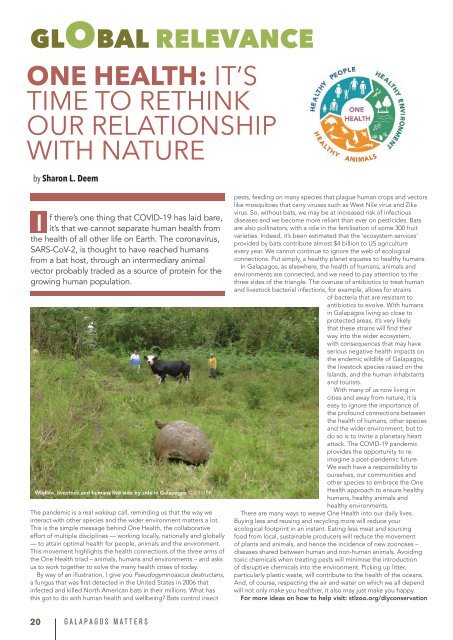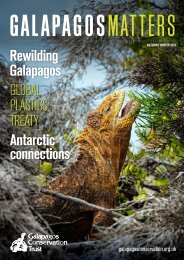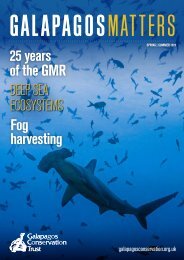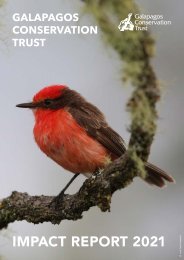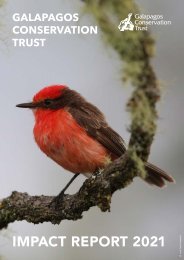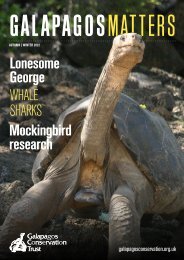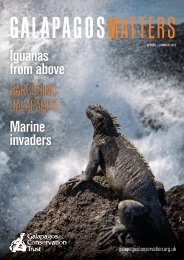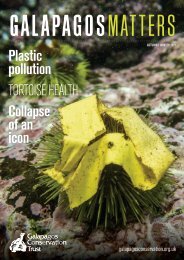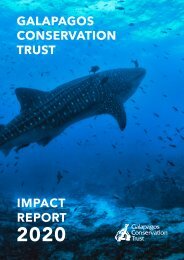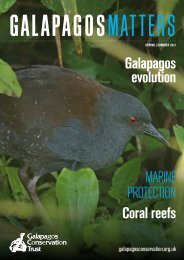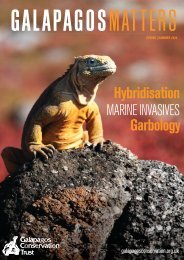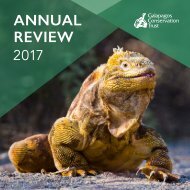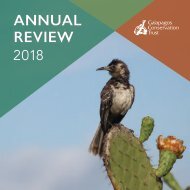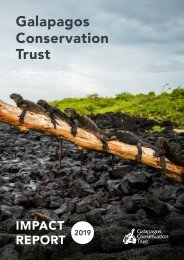Create successful ePaper yourself
Turn your PDF publications into a flip-book with our unique Google optimized e-Paper software.
GLOBAL RELEVANCE<br />
ONE HEALTH: IT’S<br />
TIME TO RETHINK<br />
OUR RELATIONSHIP<br />
WITH NATURE<br />
by Sharon L. Deem<br />
I<br />
f there’s one thing that COVID-19 has laid bare,<br />
it’s that we cannot separate human health from<br />
the health of all other life on Earth. The coronavirus,<br />
SARS-CoV-2, is thought to have reached humans<br />
from a bat host, through an intermediary animal<br />
vector probably traded as a source of protein for the<br />
growing human population.<br />
Wildlife, livestock and humans live side by side in <strong>Galapagos</strong> © GTMEP<br />
The pandemic is a real wakeup call, reminding us that the way we<br />
interact with other species and the wider environment matters a lot.<br />
This is the simple message behind One Health, the collaborative<br />
effort of multiple disciplines — working locally, nationally and globally<br />
— to attain optimal health for people, animals and the environment.<br />
This movement highlights the health connections of the three arms of<br />
the One Health triad – animals, humans and environments – and asks<br />
us to work together to solve the many health crises of today.<br />
By way of an illustration, I give you Pseudogymnoascus destructans,<br />
a fungus that was first detected in the United States in 2006 that<br />
infected and killed North American bats in their millions. What has<br />
this got to do with human health and wellbeing? Bats control insect<br />
pests, feeding on many species that plague human crops and vectors<br />
like mosquitoes that carry viruses such as West Nile virus and Zika<br />
virus. So, without bats, we may be at increased risk of infectious<br />
diseases and we become more reliant than ever on pesticides. Bats<br />
are also pollinators, with a role in the fertilisation of some 300 fruit<br />
varieties. Indeed, it’s been estimated that the ‘ecosystem services’<br />
provided by bats contribute almost $4 billion to US agriculture<br />
every year. We cannot continue to ignore the web of ecological<br />
connections. Put simply, a healthy planet equates to healthy humans.<br />
In <strong>Galapagos</strong>, as elsewhere, the health of humans, animals and<br />
environments are connected, and we need to pay attention to the<br />
three sides of the triangle. The overuse of antibiotics to treat human<br />
and livestock bacterial infections, for example, allows for strains<br />
of bacteria that are resistant to<br />
antibiotics to evolve. With humans<br />
in <strong>Galapagos</strong> living so close to<br />
protected areas, it’s very likely<br />
that these strains will find their<br />
way into the wider ecosystem,<br />
with consequences that may have<br />
serious negative health impacts on<br />
the endemic wildlife of <strong>Galapagos</strong>,<br />
the livestock species raised on the<br />
Islands, and the human inhabitants<br />
and tourists.<br />
With many of us now living in<br />
cities and away from nature, it is<br />
easy to ignore the importance of<br />
the profound connections between<br />
the health of humans, other species<br />
and the wider environment, but to<br />
do so is to invite a planetary heart<br />
attack. The COVID-19 pandemic<br />
provides the opportunity to reimagine<br />
a post-pandemic future.<br />
We each have a responsibility to<br />
ourselves, our communities and<br />
other species to embrace the One<br />
Health approach to ensure healthy<br />
humans, healthy animals and<br />
healthy environments.<br />
There are many ways to weave One Health into our daily lives.<br />
Buying less and reusing and recycling more will reduce your<br />
ecological footprint in an instant. Eating less meat and sourcing<br />
food from local, sustainable producers will reduce the movement<br />
of plants and animals, and hence the incidence of new zoonoses –<br />
diseases shared between human and non-human animals. Avoiding<br />
toxic chemicals when treating pests will minimise the introduction<br />
of disruptive chemicals into the environment. Picking up litter,<br />
particularly plastic waste, will contribute to the health of the oceans.<br />
And, of course, respecting the air and water on which we all depend<br />
will not only make you healthier, it also may just make you happy.<br />
For more ideas on how to help visit: stlzoo.org/diyconservation<br />
20 GALAPAGOS MATTERS


